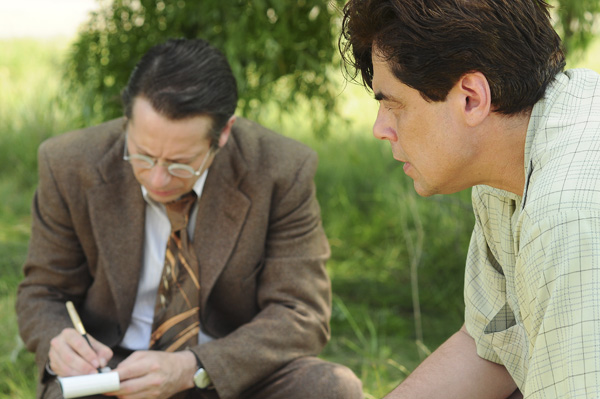Psychoanalysis, for its hundred years of deep cultural importance, is a tricky thing to depict. The nature of film seems to demand at least one moment of raw epiphany, a tension reliever for the audience, and a showy acting moment for the star. Recall Robin Williams yelling at a sobbing Matt Damon that it wasn’t his fault repeatedly in Good Will Hunting.
But psychoanalysis in reality is a very modest, piecemeal process, where a patient learns a little bit about himself every session and maybe, eventually, is able to cope with life in a healthier way. Jimmy P: Psychotherapy of a Plains Indian is among the most restrained, understated depictions of the psychoanalytic process seen on film, despite the seemingly exotic premise of an American Indian in the 1940s being treated by a quirky French anthropologist. We get a real feeling for the outsider status of patient and doctor, which bonds them and deepens each of their senses of who they are, but this is done in a relatively organic, un-showy way.
The film rests entirely on the performances of the patient, Jimmy Picard (Benicio Del Toro), and the analyst Dr. Georges Devereux (Mathieu Amalric), and both do an outstanding job. Despite his extensive credits, it is difficult to think of a better performance Del Toro has given. Jimmy is a very normal American war veteran, who just happens to be of Blackfoot Indian descent, and his illness is not dramatic—there is no Keira Knightly in A Dangerous Method-style spanking and teeth gnashing. He has headaches and general malaise without any physical basis. That the doctors at the Kansas hospital bring in a French anthropologist who specializes in Native American culture and who has spotty psychoanalytic credentials to treat Jimmy shows the closed mindedness of the era. The hospital doctors have never seen a Native American with Jimmy’s symptoms before and can not fathom that he just needs basic psychoanalysis.
Amalric plays Devereux broadly as a quintessentially French intellectual—playful, bulging eyes, an excitable, passionate disposition, with only a few hints at a seriousness of purpose beneath all of the joie de vivre. He tells Jimmy at their first meeting that he is “interested in Indians” and starts by comparing his specialty, the Navajo, to Jimmy’s Blackfoot tribe. Gradually, Devereux stops seeing him as a research tool and just as a man who has some fairly common problems stemming from his relationship history. At the end, Devereux tells his own analyst that he helped Jimmy merely because it was in his power to do so, and not for any research interest or self-importance. It is a slight shift, but we see the makings of a more serious, focused, modest doctor and scientist in Devereux. Ironically, the reason Devereux was given Jimmy as a patient, his expertise in Indian culture, was what he had to strip away in order to truly help Jimmy.
That Jimmy is such an average person is the radical thing about the film—it dares us to see a Plains Indian from the 1940s as just another steady, simple man. This is partly the reason why the film feels a bit directionless–we have no clear sense of the kind of person Jimmy wants to be, or why he is so receptive to the treatment, other than his seeming desire to be viewed, and to function, as a regular person. One’s capacity to enjoy Jimmy P. hinges on whether or not you are inclined to find the pursuit of the everyday fascinating, as well as your tolerance for cloyingly passionate French intellectual personas.







Leave A Comment